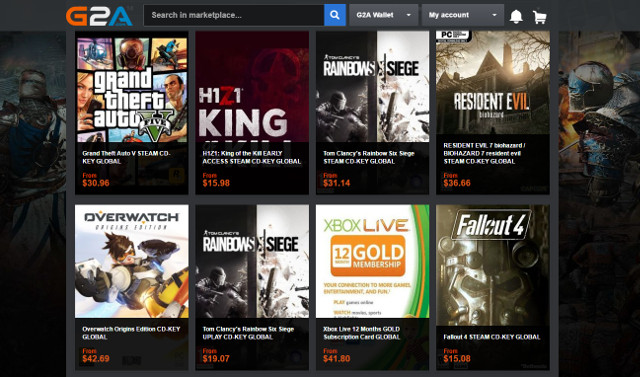Digital marketplace company G2A held an official Reddit Ask Me Anything (AMA) yesterday evening. The turnout was significant, earning thousands of comments during a six hour period. Although the company was hoping to communicate with gamers and earn positive press, the end result was a series of tumultuous interactions that, if anything, hurt the brand.
Among the most controversial comment ping-pongs during the AMA was initiated by a user by the name of LuigiTheLord who brought up the widely discussed topic of "stolen keys". Receiving more than 250 upvotes, the initial post asked, "G2A is infamous for it's tendency to sell buyers Stolen keys. What is your opinion on that?".
G2A would quickly refute the claim, stating that it has "lots of ways for checking for shady behavior", before going on to argue that it has "over 100 people" (15% of its staff) at the company dedicated to detecting fraud and theft. It was clear it didn't want to associate itself with any black market activity.
After a brief back and forth, LuigiTheLord took the opportunity to post a "fake" auction of his own on the G2A website, an auction that would serve as a live example of an illegitimate key sale. Rather than seeing this as an opportunity to showcase how it would handle such situations, or at the very least taking it as feedback, G2A immediately took action against the user, stating that all his "auctions are now subject to stricter verification". This translated to LuigiTheLord being permanently banned from purchasing or selling on the website, in addition to losing access to the funds on his veteran account.

We've brought up the point before that G2A flourishes on black market practices, where pirates and even organized companies use tactics such as stolen credit card purchases to acquire keys in bulk before selling them on the open marketplace. G2A has time and time again argued that it takes drastic measures to stop and prevent such activity on its site, but there's a mountain of evidence that it doesn't.
The truth is that G2A's entire business model is founded on fraudulent keys. While it isn't uncommon that consumers acquire keys that they'd rather sell than use, the market doesn't come anywhere close to being able to substantiate a multi-milion dollar business. It's the millions of fraudulent keys being readily available that makes such a business model possible.
The worst part of it all is these key sales hurt developers/publishers directly. In a large number of cases, the keys are purchased using stolen credit cards, and the transactions are later hit with a chargeback once a complaint is filed by the credit card holder. When this happens, the developer is fined for accepting a fraudulent transaction ($20 to $30 per sale) and has to turn over the money from each sale. This can add up to hundreds of thousand of dollars in losses.
Later, paper work is involved, the developer/publisher has to put in effort to void the keys, and the end result is a mess that costs the company thousands of dollars and a wealth of time. Such was the case of tinyBuild's story where G2A sold over $450,000 dollars worth of its game keys.
 Cloud9 is one of many eSports organizations that G2A has sponsored.
Cloud9 is one of many eSports organizations that G2A has sponsored.And yet G2A is a thriving business worth tens of millions of dollars with over 700 employees around the world. It even sponsors major eSports teams and YouTube/Twitch personalities, offering discount codes to market its brand on high visibility channels. It is profiting off the black market industry in unprecedented fashion.
As dark as it may be, consumers are always interested in paying bottom dollar for their games no matter where the money is going to—hence the success of the used game market. G2A's user storefronts host some of the best prices on games, software, and digital items on the entire internet, making it a go-to place for thousands of consumers. Although it has been brought up in negative light on a routine basis, it has continued to grow, and currently hosts more traffic and transactions than at any other time in the company's six years of history.







